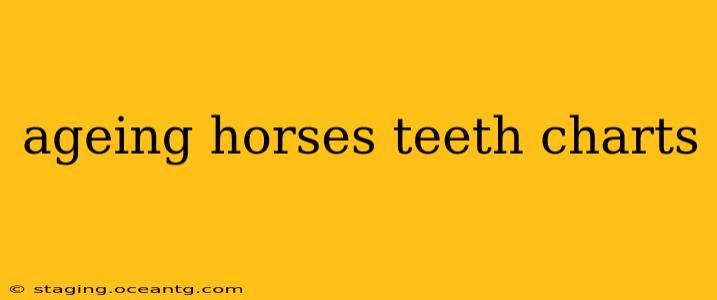Determining a horse's age can be tricky, especially in older animals where physical characteristics become less reliable. While veterinary examination remains the gold standard, understanding equine dentition plays a crucial role in age estimation. This guide explores the use of teeth charts for ageing horses, highlighting the complexities and limitations of this method. We'll also delve into the importance of regular dental care for horses of all ages.
What are Horse Teeth Charts and How are they Used?
Horse teeth charts are visual aids depicting the typical development and wear patterns of equine teeth at various ages. They aren't exact scientific instruments, but rather valuable tools used in conjunction with other observations. Experienced vets and farriers use these charts by examining the horse's teeth, noting features like the shape and angles of the incisors (front teeth), the presence of cups (depressions in the chewing surface), and the overall degree of wear. By comparing these features to the chart, they can estimate the horse's age.
Remember, however, that individual variations in tooth wear can occur due to diet, genetics, and overall health. A horse that grazes consistently on abrasive pasture will show more wear than a horse fed primarily hay in a stall. This is why relying solely on a teeth chart for accurate age determination is insufficient.
Can You Accurately Determine a Horse's Age Using Only Teeth Charts?
No, relying solely on teeth charts for accurate age determination is unreliable. While they provide a helpful guideline, several factors influence tooth wear and development:
- Breed: Different breeds have varying rates of tooth wear and development.
- Diet: A horse's diet significantly impacts tooth wear. Hard feed and abrasive pastures will lead to faster wear.
- Dental Health: Diseases or abnormalities affecting teeth can distort wear patterns.
- Individual Variation: Just like humans, horses exhibit individual differences in their dental development and wear.
Therefore, using teeth charts should be considered a supplementary method rather than the primary way to determine a horse's age.
What Other Factors Indicate a Horse's Age Besides Teeth?
Veterinarians utilize a combination of factors to estimate a horse's age, including:
- Physical Examination: Assessing the horse's overall body condition, muscle tone, and the presence of age-related conditions.
- Medical History: Reviewing any existing records or information about the horse's past health.
- Coat and Skin: Examining the coat's texture and the skin's elasticity.
- Eyes: Observing the clarity and condition of the eyes.
This holistic approach ensures a more accurate age estimation than solely relying on teeth.
What is the Importance of Regular Dental Care for Horses?
Regular dental care is crucial for a horse's overall health and well-being. Dental problems can lead to:
- Difficulty Eating: This can cause weight loss and malnutrition.
- Behavioral Changes: Pain in the mouth can result in behavioral issues such as head tossing or unwillingness to work.
- Infection: Dental problems can lead to serious infections.
Routine dental examinations by a veterinarian specializing in equine dentistry are recommended, typically annually or biannually depending on the horse's age and dental health.
How Often Should a Horse's Teeth be Checked by a Vet?
The frequency of dental check-ups depends on several factors, including the horse's age, breed, diet, and overall dental health. Young horses, particularly those still developing their adult teeth, may need more frequent examinations. Older horses typically require more frequent checkups due to increased risk of dental issues. A qualified equine veterinarian can assess your horse's individual needs and recommend a suitable checkup schedule.
Conclusion:
While teeth charts offer a helpful visual guide for estimating a horse's age, they should be used in conjunction with a thorough veterinary examination considering various factors influencing dental development. Prioritizing regular dental care is crucial for maintaining your horse's health and overall well-being. Always consult with a qualified equine veterinarian for accurate age determination and appropriate dental care.
